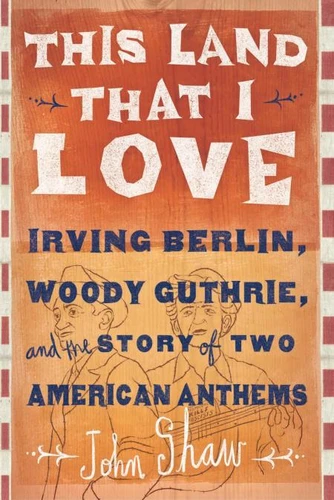This Land that I Love. Irving Berlin, Woody Guthrie, and the Story of Two American Anthems
Par :Formats :
Disponible dans votre compte client Decitre ou Furet du Nord dès validation de votre commande. Le format ePub protégé est :
- Compatible avec une lecture sur My Vivlio (smartphone, tablette, ordinateur)
- Compatible avec une lecture sur liseuses Vivlio
- Pour les liseuses autres que Vivlio, vous devez utiliser le logiciel Adobe Digital Edition. Non compatible avec la lecture sur les liseuses Kindle, Remarkable et Sony
- Non compatible avec un achat hors France métropolitaine
 , qui est-ce ?
, qui est-ce ?Notre partenaire de plateforme de lecture numérique où vous retrouverez l'ensemble de vos ebooks gratuitement
Pour en savoir plus sur nos ebooks, consultez notre aide en ligne ici
- Nombre de pages288
- FormatePub
- ISBN978-1-61039-224-2
- EAN9781610392242
- Date de parution04/11/2013
- Protection num.Adobe DRM
- Infos supplémentairesepub
- ÉditeurPublicAffairs
Résumé
February, 1940: After a decade of worldwide depression, World War II had begun in Europe and Asia. With Germany on the march, and Japan at war with China, the global crisis was in a crescendo. America's top songwriter, Irving Berlin, had captured the nation's mood a little more than a year before with his patriotic hymn, "God Bless America." Woody Guthrie was having none of it. Near-starving and penniless, he was traveling from Texas to New York to make a new start.
As he eked his way across the country by bus and by thumb, he couldn't avoid Berlin's song. Some people say that it was when he was freezing by the side of the road in a Pennsylvania snowstorm that he conceived of a rebuttal. It would encompass the dark realities of the Dust Bowl and Great Depression, and it would begin with the lines: "This land is your land, this land is my land." In This Land That I Love, John Shaw writes the dual biography of these beloved American songs.
Examining the lives of their authors, he finds that Guthrie and Berlin had more in common than either could have guessed. Though Guthrie's image was defined by train-hopping, Irving Berlin had also risen from homelessness, having worked his way up from the streets of New York. At the same time, This Land That I Love sheds new light on our patriotic musical heritage, from "Yankee Doodle" and "The Star-Spangled Banner" to Martin Luther King's recitation from "My Country 'Tis of Thee" on the steps of the Lincoln Memorial in August 1963.
Delving into the deeper history of war songs, minstrelsy, ragtime, country music, folk music, and African American spirituals, Shaw unearths a rich vein of half-forgotten musical traditions. With the aid of archival research, he uncovers new details about the songs, including a never-before-printed verse for "This Land Is Your Land." The result is a fascinating narrative that refracts and re-envisions America's tumultuous history through the prism of two unforgettable anthems.
As he eked his way across the country by bus and by thumb, he couldn't avoid Berlin's song. Some people say that it was when he was freezing by the side of the road in a Pennsylvania snowstorm that he conceived of a rebuttal. It would encompass the dark realities of the Dust Bowl and Great Depression, and it would begin with the lines: "This land is your land, this land is my land." In This Land That I Love, John Shaw writes the dual biography of these beloved American songs.
Examining the lives of their authors, he finds that Guthrie and Berlin had more in common than either could have guessed. Though Guthrie's image was defined by train-hopping, Irving Berlin had also risen from homelessness, having worked his way up from the streets of New York. At the same time, This Land That I Love sheds new light on our patriotic musical heritage, from "Yankee Doodle" and "The Star-Spangled Banner" to Martin Luther King's recitation from "My Country 'Tis of Thee" on the steps of the Lincoln Memorial in August 1963.
Delving into the deeper history of war songs, minstrelsy, ragtime, country music, folk music, and African American spirituals, Shaw unearths a rich vein of half-forgotten musical traditions. With the aid of archival research, he uncovers new details about the songs, including a never-before-printed verse for "This Land Is Your Land." The result is a fascinating narrative that refracts and re-envisions America's tumultuous history through the prism of two unforgettable anthems.
February, 1940: After a decade of worldwide depression, World War II had begun in Europe and Asia. With Germany on the march, and Japan at war with China, the global crisis was in a crescendo. America's top songwriter, Irving Berlin, had captured the nation's mood a little more than a year before with his patriotic hymn, "God Bless America." Woody Guthrie was having none of it. Near-starving and penniless, he was traveling from Texas to New York to make a new start.
As he eked his way across the country by bus and by thumb, he couldn't avoid Berlin's song. Some people say that it was when he was freezing by the side of the road in a Pennsylvania snowstorm that he conceived of a rebuttal. It would encompass the dark realities of the Dust Bowl and Great Depression, and it would begin with the lines: "This land is your land, this land is my land." In This Land That I Love, John Shaw writes the dual biography of these beloved American songs.
Examining the lives of their authors, he finds that Guthrie and Berlin had more in common than either could have guessed. Though Guthrie's image was defined by train-hopping, Irving Berlin had also risen from homelessness, having worked his way up from the streets of New York. At the same time, This Land That I Love sheds new light on our patriotic musical heritage, from "Yankee Doodle" and "The Star-Spangled Banner" to Martin Luther King's recitation from "My Country 'Tis of Thee" on the steps of the Lincoln Memorial in August 1963.
Delving into the deeper history of war songs, minstrelsy, ragtime, country music, folk music, and African American spirituals, Shaw unearths a rich vein of half-forgotten musical traditions. With the aid of archival research, he uncovers new details about the songs, including a never-before-printed verse for "This Land Is Your Land." The result is a fascinating narrative that refracts and re-envisions America's tumultuous history through the prism of two unforgettable anthems.
As he eked his way across the country by bus and by thumb, he couldn't avoid Berlin's song. Some people say that it was when he was freezing by the side of the road in a Pennsylvania snowstorm that he conceived of a rebuttal. It would encompass the dark realities of the Dust Bowl and Great Depression, and it would begin with the lines: "This land is your land, this land is my land." In This Land That I Love, John Shaw writes the dual biography of these beloved American songs.
Examining the lives of their authors, he finds that Guthrie and Berlin had more in common than either could have guessed. Though Guthrie's image was defined by train-hopping, Irving Berlin had also risen from homelessness, having worked his way up from the streets of New York. At the same time, This Land That I Love sheds new light on our patriotic musical heritage, from "Yankee Doodle" and "The Star-Spangled Banner" to Martin Luther King's recitation from "My Country 'Tis of Thee" on the steps of the Lincoln Memorial in August 1963.
Delving into the deeper history of war songs, minstrelsy, ragtime, country music, folk music, and African American spirituals, Shaw unearths a rich vein of half-forgotten musical traditions. With the aid of archival research, he uncovers new details about the songs, including a never-before-printed verse for "This Land Is Your Land." The result is a fascinating narrative that refracts and re-envisions America's tumultuous history through the prism of two unforgettable anthems.








